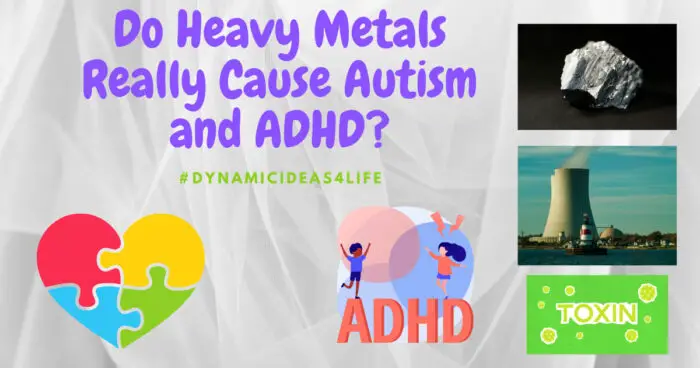Do Heavy Metals Really Cause Autism and ADHD? This is a big topic of discussion for people. Especially parents of children with such brain disorders, and for good reason. Heavy metals such as lead, mercury, and arsenic are known to be toxic to humans, and exposure to these substances can have serious health consequences.
In recent years, there has been growing concern that heavy metal exposure may be linked to the development of neurodevelopmental disorders such as autism and attention-deficit/hyperactivity disorder (ADHD).
However, the extent of this link and the evidence behind it is a topic of significant debate amongst researchers and healthcare professionals alike but how bad really is this?
Importance of discussing this topic
So given the potential impact of heavy metal exposure on human health and the prevalence of autism and ADHD, it is essential to understand the facts and myths surrounding this topic.
Many parents, caregivers, and concerned individuals may be searching for answers about the potential causes of these disorders, and it is important to provide accurate information to help guide their decision-making.
For this, what this article aims to explore is the link between heavy metals and autism/ADHD by examining the scientific evidence and theories behind this connection.
We will also discuss the prevalence and symptoms of these neurodevelopmental disorders, and explore ways to reduce exposure to heavy metals and prevent or manage autism and ADHD.
Finally, we will provide suggestions for future research and discuss the implications of this topic for public health.
Now, let’s get started…
Do Heavy Metals Really Cause Autism and ADHD?
Some studies have suggested that exposure to heavy metals and environmental toxins can cause serious to permanent damage to neurological development, even to the point that it can cause Autism and ADHD.
However, does the evidence really support this?
*In the video above it talks about heavy metals in baby food causing autism and ADHD. Really this is quite sinister because a lot of parents rely on the convenience of ready-made baby food. There definitely do seem to be some connections here and we will look to explore this further on throughout today’s post.
So let’s dive in and find out more…
Heavy Metals and Environmental Toxins – Where Do They Really Come From?

*Common heavy metals Include Cadmium, Lead, Arsenic, and Mercury*
Heavy metals are a group of chemical elements with a high atomic weight and density. They include substances such as lead, mercury, cadmium, arsenic, and chromium, among others.
These metals are found naturally in the environment, but they can also be released into the air, water, and soil through human activities such as mining, manufacturing, and burning fossil fuels.
However, we may not expect to come into contact with heavy metals is from;
- Air pollution from industrial and transportation sources
- Soil contaminated by pesticides, fertilizers, and waste disposal
- Water contaminated by industrial discharges, sewage, and agricultural runoff
- Food contaminated by environmental pollution or food processing methods, such as lead-glazed pottery or canned foods
The Impact of Heavy Metals on Human Health
Exposure to heavy metals can have serious health consequences, particularly for vulnerable populations such as children, pregnant women, and people with certain genetic or medical conditions.
Heavy metals can accumulate in the body over time, leading to damage to the brain, kidneys, liver, and other organs. [R]
The specific health effects of heavy metal exposure depend on the type of metal, the dose, and the duration of exposure.
Like for example, lead exposure can cause developmental delays, cognitive impairment, and behavioral problems in children, while mercury exposure can lead to neurological damage and impaired cognitive function. Arsenic exposure on the other hand has been linked to an increased risk of cancer and skin lesions, among other health problems.
So reducing exposure to heavy metals is essential to protect human health, and measures such as regulation of industrial pollution, use of protective equipment, and public education can all play a role in achieving this goal.
But now getting to the other main point of this article. Autism and ADHD
About Autism and ADHD – A Quick Overview
Autism spectrum disorder (ASD) and attention-deficit/hyperactivity disorder (ADHD) are two neurodevelopmental disorders that can affect a person’s ability to learn, communicate, and interact with others.

ASD is characterized by difficulties with social communication and interaction, as well as restricted and repetitive behaviors and interests.
Symptoms can range from mild to severe and may include delays in language development, difficulty making eye contact or understanding social cues, and intense focus on specific topics or objects.
ADHD is characterized by symptoms of inattention, hyperactivity, and impulsivity that can impact daily functioning.
These symptoms can include difficulty focusing or staying on task, restlessness or fidgeting, and impulsive behavior such as interrupting others or acting without thinking.
The Modern Day Prevalence of Autism and ADHD
ASD and ADHD are both relatively common, with estimates of their prevalence varying depending on the criteria used for diagnosis and other factors. According to the Centers for Disease Control and Prevention (CDC), about 1 in 36 children in the United States have been identified as having ASD, while estimates for ADHD range from 5-10% of school-aged children.
So it is definitely becoming a lot more common in the modern age but…
What Factors Contribute To the Development of Autism and ADHD? This is the million-dollar question!
Mostly, the causes of Autism and ADHD are not generally very well understood, but research suggests that multiple factors may be involved in their development.
Genetic factors are known to play a role, with certain gene variations associated with an increased risk of developing these disorders. Environmental factors such as prenatal exposure to toxins, maternal infections during pregnancy, and premature birth may also increase the risk of developing ASD or ADHD.
But also other factors that may contribute to the development of these disorders include disruptions in brain development or function, differences in the structure or activity of certain brain regions, and imbalances in neurotransmitter systems that affect attention, motivation, and emotion.
Even some may claim this to be part of a mass awakening of higher awareness and the Age of Aquarius but seriously let’s get to the point.
The Link Between Heavy Metals and Autism/ADHD
There have been various theories about the potential link between heavy metals and the development of Autism and ADHD. One hypothesis suggests that heavy metal exposure during critical periods of brain development may lead to structural and functional changes in the brain that contribute to the development of these disorders.
Another hypothesis suggests that heavy metals may act as neurotoxins that directly damage the brain and impair cognitive function. The scientific evidence regarding the link between heavy metals and autism and ADHD is mixed.
Some studies have found an association between heavy metal exposure and increased risk of these disorders, while others have not. For example, a study published in the journal Environmental Health Perspectives in 2012 found that prenatal exposure to mercury and lead was associated with an increased risk of ADHD symptoms in children. [R]
Similarly, a study published in the journal Pediatrics in 2018 found that higher levels of lead exposure during childhood were associated with a higher risk of ADHD.
However, other studies have not found a significant association between heavy metal exposure and autism or ADHD.
A review of the scientific literature published in the journal Current Opinion in Pediatrics in 2017 concluded that there is limited evidence to support a causal link between heavy metal exposure and the development of autism and ADHD.
However…
One of the main limitations of existing research on the link between heavy metals and autism/ADHD is the difficulty of measuring exposure levels accurately. Heavy metal exposure can occur through multiple sources, and it can be challenging to determine the exact dose and timing of exposure.
In addition, many studies rely on self-reported data or proxy measures of exposure, which can be subject to bias and inaccuracies.
Also, another limitation is the complexity of the relationship between heavy metals and neurodevelopmental disorders. Multiple factors, including genetics, environmental exposures, and other medical conditions, may interact to contribute to the development of these disorders.
Therefore, it can be challenging to isolate the specific effects of heavy metal exposure on neurodevelopment. [R]
But yet still what might be beneficial for some people to look at is…
Prevention and Treatment of Heavy Metal and Environmental Toxin Exposure
Reducing exposure to heavy metals in the environment can help lower the risk of health problems, including neurodevelopmental disorders like autism and ADHD. Some ways to reduce exposure include:
- Avoiding products that contain heavy metals, such as lead-based paints and mercury-containing seafood.
- Using air filters and water filters to reduce exposure to airborne or waterborne heavy metals.
- Following safe disposal practices for products containing heavy metals, such as batteries and electronic waste.
- Taking precautions when working with heavy metals, such as wearing protective clothing and following safety guidelines.
However, further to this preventing or managing Autism and ADHD requires a comprehensive approach that addresses both genetic and environmental factors.
Some strategies that may help include:
- Early intervention: Early identification and treatment of autism and ADHD can help improve outcomes and reduce the impact of symptoms on daily functioning.
- Behavioral therapies: The likes of cognitive-behavioral therapy (CBT) and social skills training, can help individuals with autism and ADHD learn coping strategies and improve social interaction and communication skills.
- Medication: Stimulants and non-stimulants, may be prescribed to manage symptoms of ADHD.
- Support Services: Services, such as special education services and vocational training, can help individuals with autism and ADHD achieve their full potential and lead fulfilling lives.
So, these are just ideas but I wouldn’t really say Autism/ADHD is treatable, but it may be preventable for future generations by means of avoiding heavy metal exposure or detoxing from heavy metal and environmental toxin contamination.
One supplement that may help with this is Zeolite Clinopiloate.
In Conclusion
So In this article, we have explored the controversy surrounding the potential link between heavy metals and Autism/ADHD. We have discussed the sources and impact of heavy metals on human health, the definitions and prevalence of autism and ADHD, the theories and scientific studies regarding the link between heavy metals and these disorders, and the strategies for prevention and treatment.
But still, while the evidence regarding the link between heavy metals and autism/ADHD is still inconclusive, it is clear that heavy metal exposure can have detrimental effects on human health. Therefore, it is important to take steps to reduce exposure to heavy metals and other environmental toxins and to seek medical advice if you suspect that you or a loved one may have Autism or ADHD.
*Please let us know what you think in the comments below…
Suggestions for Future Research
Further research is needed to better understand the potential link between heavy metals and Autism/ADHD, including the specific mechanisms by which heavy metals may impact brain development and function.
Additionally, more research is needed to explore effective prevention and treatment strategies for these disorders, as well as strategies to reduce exposure to environmental toxins more broadly.
By continuing to investigate these important topics, we can work towards better health outcomes for individuals with autism, ADHD, and other neurodevelopmental disorders.
Thanks for reading and check out some of our references below;
References
- Kern, J. K., Geier, D. A., Audhya, T., King, P. G., Sykes, L. K., & Geier, M. R. (2016). Evidence of parallels between mercury intoxication and the brain pathology in autism. Acta Neurobiologiae Experimentalis, 76(2), 113-133.
- Grandjean, P., & Landrigan, P. J. (2014). Neurobehavioural effects of developmental toxicity. The Lancet Neurology, 13(3), 330-338.
- Sharma, A., Madaan, V., & Petty, F. D. (2018). A review of the relationship between heavy metal exposure and attention-deficit/hyperactivity disorder in children. Frontiers in Public Health, 6, 337.
- Nigg, J. T. (2013). Attention-deficit/hyperactivity disorder and adverse health outcomes. Clinical Psychology Review, 33(2), 215-228.
- Centers for Disease Control and Prevention. (2020). Data and statistics on autism spectrum disorder. Retrieved from https://www.cdc.gov/ncbddd/autism/data.html
- American Psychiatric Association. (2013). Diagnostic and statistical manual of mental disorders (5th ed.). American Psychiatric Publishing.
- Environmental Protection Agency. (2022). Basic information about lead in drinking water. Retrieved from https://www.epa.gov/ground-water-and-drinking-water/basic-information-about-lead-drinking-water
- National Institute of Environmental Health Sciences. (2022). Heavy metals. Retrieved from https://www.niehs.nih.gov/health/topics/agents/heavy-metals/index.cfm
- World Health Organization. (2010). Childhood lead poisoning. Retrieved from https://www.who.int/en/news-room/fact-sheets/detail/childhood-lead-poisoning
Related FAQS
What Are Some Common Sources Of Heavy Metals In The Environment?
Heavy metals can be found in various sources, including contaminated soil and water, industrial pollution, certain types of food (such as seafood and rice), and consumer products (such as cosmetics and electronics).
What Are Some Common Symptoms Of Autism And ADHD?
Autism and ADHD can both present with a range of symptoms, which may include difficulties with social interaction and communication, repetitive behaviors, hyperactivity, impulsivity, and inattention. However, the specific symptoms and severity can vary widely between individuals.
Is There Any Conclusive Evidence Linking Heavy Metals And Environmental Toxins to Autism or ADHD?
The evidence regarding the link between heavy metals and autism/ADHD is still inconclusive, and further research is needed to better understand this potential connection.
How Can I Reduce My Exposure To Heavy Metals?
Some ways to reduce exposure to heavy metals include avoiding products that contain heavy metals, using air and water filters, following safe disposal practices, and taking precautions when working with heavy metals.
What Are Some Effective Treatments For Autism and ADHD?
Treatment for autism and ADHD typically involves a comprehensive approach that may include behavioral therapies, medications, and support services. The specific treatment plan will depend on the individual’s symptoms and needs and may involve a combination of different approaches.






Anxiety and Depression best ways to lower blood sugar BiOptimizers blood pressure supplements blood sugar support supplements Digestive Enzymes Supplement digital products Dr Sam Robbins Erectile dysfunction Exercise Gut Health Healthy Living heart health HFL how to lower blood sugar levels How To Lower Cholesterol insulin resistance joint health supplement Keto keto dieting Keto Diet Weight Loss leaky gut supplements leptin resistance list Magnesium deficiency Matt Gallant mental health multivitamins Nootropics nutrient supplements Probiotics Probiotic Supplements proteolytic enzymes reverse type 2 diabetes stress and anxiety stress relief vitabalance vitapost Wade Lightheart weight loss articles weight loss diet plans weight loss product reviews weight loss supplements weight loss supplements that work weight loss tea
